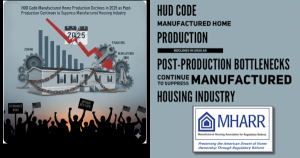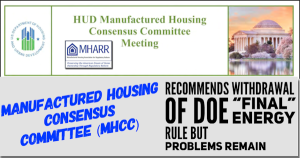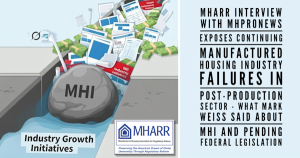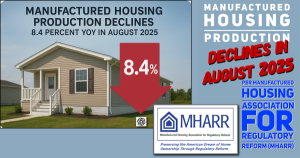MHARR Persistence Pays Off – FHFA Admits Reality: Fannie and Freddie Not Serving Manufactured Housing Under Duty To Serve
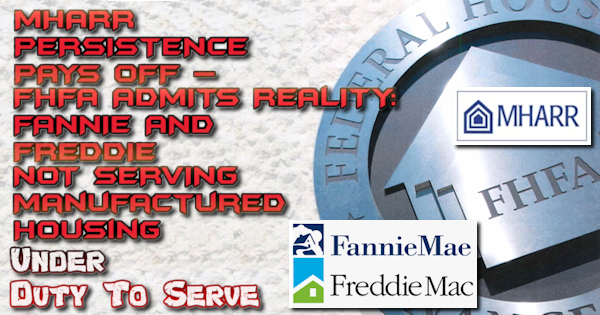
Washington, D.C., November 4, 2020 – As confirmed by the Manufactured Housing Association for Regulatory Reform (MHARR), a report recently submitted to Congress by the Federal Housing Finance Agency (FHFA) — the federal regulator for mortgage giants Fannie Mae and Freddie Mac – reveals, for the first time, how those entities have been certified by FHFA as allegedly being “in compliance” with the statutory Duty to Serve Underserved Markets (DTS) mandate regarding manufactured housing when, in fact, they are only serving a tiny fraction of the mainstream manufactured housing market. Specifically, the report reveals that this “in compliance” determination is the result of a deceptive fiction, whereby an entire category of manufactured home consumer lending – representing nearly 80 percent of the entire manufactured home consumer loan market — is totally excluded from FHFA’s compliance evaluation.
Under the DTS mandate, enacted by Congress as part of the Housing and Economic Recovery Act of 2008 (HERA), Fannie Mae and Freddie Mac were directed to provide securitization and secondary market support for three historically underserved segments of the housing industry, specifically including affordable, federally-regulated manufactured housing. The DTS provision, moreover, makes it abundantly clear that support for mainstream manufactured housing is to include consumer loans for manufactured homes titled as both real estate and personal property, often referred to as “chattel loans.”
Nearly 13 years after the enactment of DTS, however, neither Fannie Mae nor Freddie Mac have securitized a single manufactured housing personal property loan – and have no current plans to provide any DTS support for such loans for the foreseeable future – despite the fact that personal property loans comprise (and have historically comprised) nearly 80 percent of the manufactured housing market, according to U.S. Census Bureau data. This lack of DTS support, in turn, has helped perpetuate a less-than-fully-competitive manufactured housing consumer lending market, with consumers effectively forced to rely on higher-cost loans originated by a small handful of dominant lenders affiliated with the industry’s largest corporate conglomerates. Thus, as reported by Freddie Mac itself, “More than 90% of the personal property loans reported in the 2018” Home Mortgage Disclosure Act (HMDA) data were “higher-cost originations.”
The impact of this total lack of DTS support for the vast bulk of the mainstream manufactured housing market and the overwhelming majority of manufactured housing consumers is profoundly negative. First, it subjects better-qualified borrowers to unnecessarily high interest rates. Second, it totally excludes from the market qualified consumers who could afford market-competitive, DTS-supported interest rates, but not the higher interest rates currently being charged without DTS support for mainstream manufactured housing personal property loans. And third, it has artificially suppressed the production of mainstream, affordable manufactured homes, devastating the industry, with production levels over the past decade-plus well below historical norms and 2019 and 2020 production levels that have fallen even further.
Against this backdrop, and despite Congress’ clear intention and mandate to include mainstream manufactured housing personal property loans within the scope of DTS to ensure full-scale, market-significant support for the manufactured housing market as a remedy for decades of neglect, Fannie and Freddie – with FHFA’s de facto consent and approval — have totally ignored and avoided manufactured home chattel lending. And now, in its latest report to Congress, FHFA finally – after being “smoked out” by persistent MHARR pressure – acknowledges that its certification of Fannie and Freddie’s alleged DTS “compliance,” is based on a complete fiction, which excludes the entire chattel sector of the market. In relevant part, FHFA states in that report:
“For manufactured homes titled as personal property, or chattel loans, both Enterprises submitted infeasibility requests on their chattel pilot initiatives, requesting that FHFA exclude these objectives from consideration during the annual Duty to Serve performance evaluation for 2019. An Enterprise may submit an infeasibility request if underserved market conditions or other extenuating circumstances outside of its control substantially interfere with its accomplishment of an objective. FHFA approved these infeasibility requests on February 27, 2020.”
(See, pages 17-24 of the attached FHFA report).
Consequently, FHFA’s DTS compliance certification is based solely on the real estate segment of the HUD Code manufactured housing market which, according to U.S. Census Bureau data, comprises only a small fraction of all manufactured home sales. This, in turn, has restricted DTS support to only 4-5 percent of new HUD Code home sales since the initial implementation of the DTS program in 2018. Conversely, some 94-95 percent of the new mainstream manufactured housing market, as maintained by MHARR, has gone completely unserved under DTS over the same period – FHFA’s phony and misleading certifications notwithstanding.
This deception and gamesmanship – by entities that nearly crashed the U.S. economy during the 2008 housing crisis – is a disgraceful manipulation of the moderate and lower-income Americans that Congress meant to serve through DTS. Ultimately, the remedy for this travesty would be for Congress and the Administration to hold FHFA, Fannie and Freddie accountable for the full and faithful implementation of DTS within the mainstream manufactured housing market. MHARR will now pursue such a process.
The Manufactured Housing Association for Regulatory Reform is a Washington, D.C.-based national trade association representing the views and interests of independent producers of federally-regulated manufactured housing.
Washington, D.C., November 4, 2020 – As confirmed by the Manufactured Housing Association for Regulatory Reform (MHARR), a report recently submitted to Congress by the Federal Housing Finance Agency (FHFA) — the federal regulator for mortgage giants Fannie Mae and Freddie Mac – reveals, for the first time, how those entities have been certified by FHFA as allegedly being “in compliance” with the statutory Duty to Serve Underserved Markets (DTS) mandate regarding manufactured housing when, in fact, they are only serving a tiny fraction of the mainstream manufactured housing market. Specifically, the report reveals that this “in compliance” determination is the result of a deceptive fiction, whereby an entire category of manufactured home consumer lending – representing nearly 80 percent of the entire manufactured home consumer loan market — is totally excluded from FHFA’s compliance evaluation.
Under the DTS mandate, enacted by Congress as part of the Housing and Economic Recovery Act of 2008 (HERA), Fannie Mae and Freddie Mac were directed to provide securitization and secondary market support for three historically underserved segments of the housing industry, specifically including affordable, federally-regulated manufactured housing. The DTS provision, moreover, makes it abundantly clear that support for mainstream manufactured housing is to include consumer loans for manufactured homes titled as both real estate and personal property, often referred to as “chattel loans.”
Nearly 13 years after the enactment of DTS, however, neither Fannie Mae nor Freddie Mac have securitized a single manufactured housing personal property loan – and have no current plans to provide any DTS support for such loans for the foreseeable future – despite the fact that personal property loans comprise (and have historically comprised) nearly 80 percent of the manufactured housing market, according to U.S. Census Bureau data. This lack of DTS support, in turn, has helped perpetuate a less-than-fully-competitive manufactured housing consumer lending market, with consumers effectively forced to rely on higher-cost loans originated by a small handful of dominant lenders affiliated with the industry’s largest corporate conglomerates. Thus, as reported by Freddie Mac itself, “More than 90% of the personal property loans reported in the 2018” Home Mortgage Disclosure Act (HMDA) data were “higher-cost originations.”
The impact of this total lack of DTS support for the vast bulk of the mainstream manufactured housing market and the overwhelming majority of manufactured housing consumers is profoundly negative. First, it subjects better-qualified borrowers to unnecessarily high interest rates. Second, it totally excludes from the market qualified consumers who could afford market-competitive, DTS-supported interest rates, but not the higher interest rates currently being charged without DTS support for mainstream manufactured housing personal property loans. And third, it has artificially suppressed the production of mainstream, affordable manufactured homes, devastating the industry, with production levels over the past decade-plus well below historical norms and 2019 and 2020 production levels that have fallen even further.
Against this backdrop, and despite Congress’ clear intention and mandate to include mainstream manufactured housing personal property loans within the scope of DTS to ensure full-scale, market-significant support for the manufactured housing market as a remedy for decades of neglect, Fannie and Freddie – with FHFA’s de facto consent and approval — have totally ignored and avoided manufactured home chattel lending. And now, in its latest report to Congress, FHFA finally – after being “smoked out” by persistent MHARR pressure – acknowledges that its certification of Fannie and Freddie’s alleged DTS “compliance,” is based on a complete fiction, which excludes the entire chattel sector of the market. In relevant part, FHFA states in that report:
“For manufactured homes titled as personal property, or chattel loans, both Enterprises submitted infeasibility requests on their chattel pilot initiatives, requesting that FHFA exclude these objectives from consideration during the annual Duty to Serve performance evaluation for 2019. An Enterprise may submit an infeasibility request if underserved market conditions or other extenuating circumstances outside of its control substantially interfere with its accomplishment of an objective. FHFA approved these infeasibility requests on February 27, 2020.”
(See, pages 17-24 of the attached FHFA report).
Consequently, FHFA’s DTS compliance certification is based solely on the real estate segment of the HUD Code manufactured housing market which, according to U.S. Census Bureau data, comprises only a small fraction of all manufactured home sales. This, in turn, has restricted DTS support to only 4-5 percent of new HUD Code home sales since the initial implementation of the DTS program in 2018. Conversely, some 94-95 percent of the new mainstream manufactured housing market, as maintained by MHARR, has gone completely unserved under DTS over the same period – FHFA’s phony and misleading certifications notwithstanding.
This deception and gamesmanship – by entities that nearly crashed the U.S. economy during the 2008 housing crisis – is a disgraceful manipulation of the moderate and lower-income Americans that Congress meant to serve through DTS. Ultimately, the remedy for this travesty would be for Congress and the Administration to hold FHFA, Fannie and Freddie accountable for the full and faithful implementation of DTS within the mainstream manufactured housing market. MHARR will now pursue such a process.
The Manufactured Housing Association for Regulatory Reform is a Washington, D.C.-based national trade association representing the views and interests of independent producers of federally-regulated manufactured housing.


